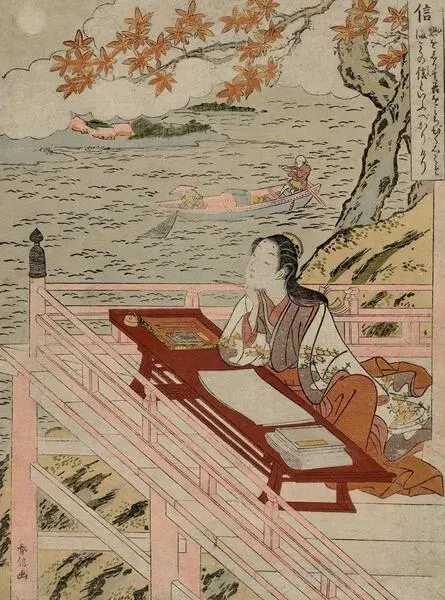Table of Contents
The Tale of Genji, by Murasaki Shikibu
Table of Contents
Chapter 1
The Paulownia Court
Chapter 2
The Broom Tree
Chapter 3
The Shell of the Locust
Chapter 4
Evening Faces
Chapter 5
Lavender
Chapter 6
The Safflower
Chapter 7
An Autumn Exersion
Chapter 8
The Festival of the Cherry Blossoms
Chapter 9
Heartvine
Chapter 10
The Sacred Tree
Chapter 11
The Orange Blossoms
Chapter 12
Suma
Chapter 13
Akashi
Chapter 14
Channel Buoys
Chapter 15
The Wormwood Patch
Chapter 16
The Gatehouse
Chapter 17
a Picture Contest
Chapter 18
The Wind in the Pines
Chapter 19
a Rack of Cloud
Chapter 20
The Morning Glory
Chapter 21
The Maiden
Chapter 22
The Jeweled Chaplet
Chapter 23
The First Warbler
Chapter 24
Butterflies
Chapter 25
Fireflies
Chapter 26
Wild Carnations
Chapter 27
Flares
Chapter 28
The Typhoon
Chapter 29
The Royal Outing
Chapter 30
Purple Trousers
Chapter 31
The Cypress Pillar
Chapter 32
a Branch of Plum
Chapter 33
Wisteria Leaves
Chapter 34
New Herbs
Chapter 35
New Herbs
Chapter 36
The Oak Tree
Chapter 37
The Flute
Chapter 38
The Bell Cricket
Chapter 39
Evening Mist
Chapter 40
The Rites
Chapter 41
The Wizard
Chapter 42
His Perfumed Highness
Chapter 43
The Rose Plum
Chapter 44
Bamboo River
Chapter 45
The Lady at the Bridge
Chapter 46
Beneath the Oak
Chapter 47
Trefoil Knots
Chapter 48
Early Ferns
Chapter 49
The Ivy
Chapter 50
The Eastern Cottage
Chapter 51
a Boat upon the Waters
Chapter 52
The Drake Fly
Chapter 53
The Writing Practice
Chapter 54
The Floating Bridge of Dreams
The Tale of Genji, by Murasaki Shikibu
Table of Contents
1 The Paulownia Court
2 The Broom Tree
3 The Shell of the Locust
4 Evening Faces
5 Lavender
6 The Safflower
7 An Autumn Exersion
8 The Festival of the Cherry Blossoms
9 Heartvine
10 The Sacred Tree
11 The Orange Blossoms
12 Suma
13 Akashi
14 Channel Buoys
15 The Wormwood Patch
16 The Gatehouse
17 A Picture Contest
18 The Wind in the Pines
19 A Rack of Cloud
20 The Morning Glory
21 The Maiden
22 The Jeweled Chaplet
23 The First Warbler
24 Butterflies
25 Fireflies
26 Wild Carnations
27 Flares
28 The Typhoon
29 The Royal Outing
30 Purple Trousers
31 The Cypress Pillar
32 A Branch of Plum
33 Wisteria Leaves
34 New Herbs
35 New Herbs
36 The Oak Tree
37 The Flute
38 The Bell Cricket
39 Evening Mist
40 The Rites
41 The Wizard
42 His Perfumed Highness
43 The Rose Plum
44 Bamboo River
45 The Lady at the Bridge
46 Beneath the Oak
47 Trefoil Knots
48 Early Ferns
49 The Ivy
50 The Eastern Cottage
51 A Boat upon the Waters
52 The Drake Fly
53 The Writing Practice
54 The Floating Bridge of Dreams
 Murasaki Shikibu at Ishiyama-dera. Suzuki Harunobu, 1767. Boston Museum of Fine Arts.
Murasaki Shikibu at Ishiyama-dera. Suzuki Harunobu, 1767. Boston Museum of Fine Arts.
The Tale of Genji, by Murasaki Shikibu
Chapter 1
The Paulownia Court
In a certain reign there was a lady not of the first rank whom the emperor loved more than any of the others. The grand ladies with high ambitions thought her a presumptuous upstart, and lesser ladies were still more resentful. Everything she did offended someone. Probably aware of what was happening, she fell seriously ill and came to spend more time at home than at court. The emperor’s pity and affection quite passed bounds. No longer caring what his ladies and courtiers might say, he behaved as if intent upon stirring gossip.
His court looked with very great misgiving upon what seemed a reckless infatuation. In China just such an unreasoning passion had been the undoing of an emperor and had spread turmoil through the land. As the resentment grew, the example of Yang Kuei-fei was the one most frequently cited against the lady.
She survived despite her troubles, with the help of an unprecedented bounty of love. Her father, a grand councillor, was no longer living. Her mother, an old-fashioned lady of good lineage, was determined that matters be no different for her than for ladies who with paternal support were making careers at court. The mother was attentive to the smallest detail of etiquette and deportment. Yet there was a limit to what she could do. The sad fact was that the girl was without strong backing, and each time a new incident arose she was next to defenseless.
It may have been because of a bond in a former life that she bore the emperor a beautiful son, a jewel beyond compare. The emperor was in a fever of impatience to see the child, still with the mother’s family; and when, on the earliest day possible, he was brought to court, he did indeed prove to be a most marvelous babe. The emperor’s eldest son was the grandson of the Minister of the Right. The world assumed that with this powerful support he would one day be named crown prince; but the new child was far more beautiful. On public occasions the emperor continued to favor his eldest son. The new child was a private treasure, so to speak, on which to lavish uninhibited affection.
The mother was not of such a low rank as to attend upon the emperor’s personal needs. In the general view she belonged to the upper classes. He insisted on having her always beside him, however, and on nights when there was music or other entertainment he would require that she be present. Sometimes the two of them would sleep late, and even after they had risen he would not let her go. Because of his unreasonable demands she was widely held to have fallen into immoderate habits out of keeping with her rank.
With the birth of the son, it became yet clearer that she was the emperor’s favorite. The mother of the eldest son began to feel uneasy. If she did not manage carefully, she might see the new son designated crown prince. She had come to court before the emperor’s other ladies, she had once been favored over the others, and she had borne several of his children. However much her complaining might trouble and annoy him, she was one lady whom he could not ignore.
Though the mother of the new son had the emperor’s love, her detractors were numerous and alert to the slightest inadvertency. She was in continuous torment, feeling that she had nowhere to turn. She lived in the paulownia Court. The emperor had to pass the apartments of other ladies to reach hers, and it must be admitted that their resentment at his constant comings and goings was not unreasonable. Her visits to the royal chambers were equally frequent. The robes of her women were in a scandalous state from trash strewn along bridges and galleries. Once some women conspired to have both doors of a gallery she must pass bolted shut, and so she found herself unable to advance or retreat. Her anguish over the mounting list of insults was presently more than the emperor could bear. He moved a lady out of rooms adjacent to his own and assigned them to the lady of the paulownia Court and so, of course, aroused new resentment.
Читать дальше

 Murasaki Shikibu at Ishiyama-dera. Suzuki Harunobu, 1767. Boston Museum of Fine Arts.
Murasaki Shikibu at Ishiyama-dera. Suzuki Harunobu, 1767. Boston Museum of Fine Arts.










